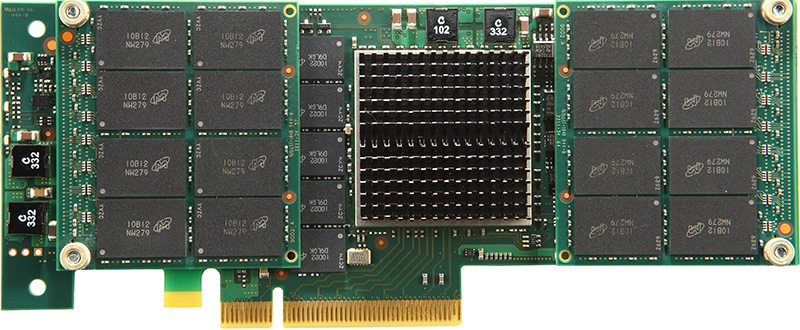Micron RealSSD P320h Review: A PCIe Drive Capable Of 3.2 GB/s
Announced earlier this year, Micron's RealSSD P320h PCI Express-based SSD promises to be an enterprise workhorse. A custom controller, single-level cell NAND, amazingly low latency, stellar random I/O, and incredible endurance combine to blow us away.
Get Tom's Hardware's best news and in-depth reviews, straight to your inbox.
You are now subscribed
Your newsletter sign-up was successful
Meet Micron's P320h PCI Express-Based SSD
A number of storage vendors have jumped into the PCI Express-based SSD market during the past 18 months. With a few exceptions (notably, Fusion-io), the formula is fairly simple. Take a few SATA-based controllers, mix in a RAID controller, some RAM, set the blender to emulsify, and in a few minutes you have a storage device unencumbered by the 6 Gb/s SATA interface.
Alright, so it's not quite that simple. But those are the basic building blocks we're seeing from most vendors. Micron eschews that approach by baking up something completely different.
Meet the company's P320h half-height, half-length PCI Express-based SSD. The P320h is available in 350 and 700 GB capacities, selling for $3,495 and $6,995, respectively. That's expensive, no doubt. But for $10/GB you get very impressive performance specifications.
You should be aware that Micron sells the RealSSD P320h in one other format (aside from the half-height, half-length design we're reviewing today). Its 2.5" PCI Express RealSSD P320h is available in 175 and 350 GB capacities, but is limited to 415,000 4 KB random read IOPS and 1.75 GB/s in sequential reads. Though those numbers are still impressive, the form factor requires a server equipped with the right interface to support it.
| Micron P320H | ||
|---|---|---|
| User Capacity | 350 GB | 700 GB |
| Interface | PCI Express 2.0 x8, Half-Height, Half-Length | |
| Sequential Read | 3.2 GB/s | |
| Sequential Write | 1.9 GB/s | |
| 4 KB Random Read | 785,000 IOPS | |
| 4 KB Random Write | 205,000 IOPS | |
| Power Consumption (Active) | 25 W | |
| Power Consumption (Idle) | 10 W | |
| Write Endurance | 25 PB | 50 PB |
With specified read performance up to 3.2 GB/s and as many as 785,000 4 KB random write IOPS, Micron is basically saturating a second-gen PCI Express x8 link with the HHHL version of its P320h. The use of single-level cell NAND allows for 50 PB of write endurance on the 700 GB variant. At a high level, those are all impressive numbers. But lets take a deeper look to see how Micron achieves such ambitious specs.
Get Tom's Hardware's best news and in-depth reviews, straight to your inbox.
Current page: Meet Micron's P320h PCI Express-Based SSD
Next Page Micron's 32-Channel Controller Simplifies PCIe-Based SSDs-
mayankleoboy1 i dont see this as the future of consumer SSD's, just like a 16 core CPU is not the future of consumer CPU's.Reply -
bawchicawawa mayankleoboy1i dont see this as the future of consumer SSD's, just like a 16 core CPU is not the future of consumer CPU's.Reply
Such an apples to oranges comparison... -
memadmax Eliminating the SAS controller is the logical way to have these pci-e based ssd drives...Reply
Kinda surprised something like this didn't come out first as it makes more sense.... -
mayankleoboy1 bawchicawawaSuch an apples to oranges comparison...Reply
really ? Increasingly, performance is basically dependent on extracting parallelism. Whether in storage or in CPU performance.
Desktop/Mainstream users just dont do so much in parallel that they can fully use all the hardware. -
JOSHSKORN mayankleoboy1i dont see this as the future of consumer SSD's, just like a 16 core CPU is not the future of consumer CPU's.I see a purpose for 16 core processors. How are we going to otherwise be able to run Crysis 6?Reply -
mayankleoboy1 JOSHSKORNI see a purpose for 16 core processors. How are we going to otherwise be able to run Crysis 6?Reply
Use a 5000 core GPU ? -
youssef 2010 ArticleAlthough read performance is out of this world, the RealSSD P320h's write performance isn't nearly as spectacular. That's not to say the drive doesn't do well; it's just not as impressive after looking at those massive read numbers. read performance was out of this world, the write performance wasn't nearly as spectacular. Now, that's not to say that the P320h doesn't perform well, it's just not as impressive as the read resultsReply
????????!!!!!!!!!!! -
abbadon_34 After all these years it's nice to see the OCZ Revo at least mentioned. Considering a bootable PCI-E x4 SSD can be had for under $200 for over 5 years now, and is on it's 4th+ generation, one can only wonder why it's been ignored for so long.Reply -
Marcus52 Micron deserves a pat on the back for this one!Reply
Thanks for the review, love to see this kind of advancement and a peak into the future new hardware brings with it, even if it isn't directly applicable to me at this point in time.
